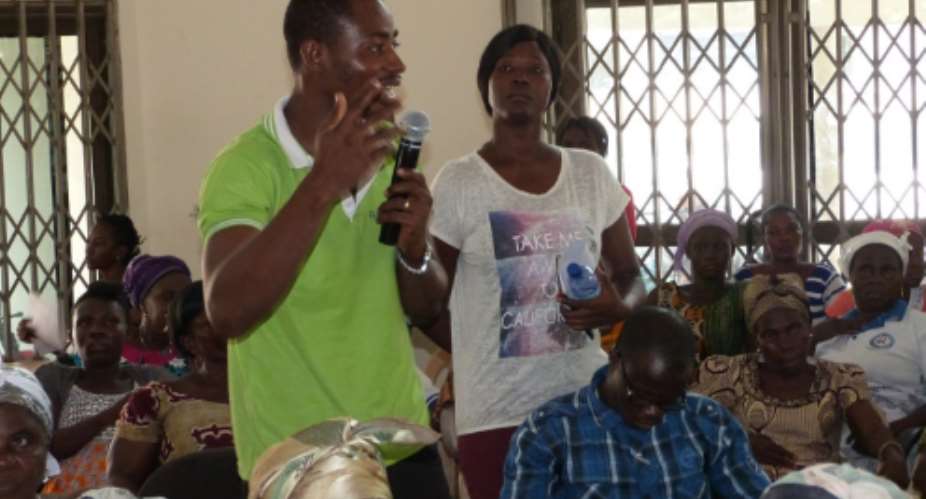The African Development Programme (ADP) has held the 2017 first Social Public Expenditure and Financial Accountability (SPEFA) Forum for the Ga West Municipal Assembly in Amasaman with participants rating the assembly’s service delivery as “not so good”.
The SPEFA forum, an educative public meeting took an innovative twist to get the citizens to experiment with critical tools in engaging duty bearers on issues that affected them. The Community Score Card was used to assess the service delivery indicators, and rating score of 1 to 5 with 1 being poor, 2=not so good, 3=average, 4=good and 5=Excellent and reasons for the score was administered.
Overall, all the service delivery indicators had a score below 2 (not so Good), ranging from a score of (1.3 to 1.8. District Average). Only two services (Responsiveness of public health workers in the district and Accessibility of Water) equaled the Not so Good score with a score of 2.3 and 2 respectively. The lowest score 1.3 was ease of obtaining building permit followed by 1.4 for Responsiveness of assembly staff to the needs of citizens.
In relation to the community/electoral areas, Okushibiade scored good for accessibility and excellent for quality of water. Manchie also scored excellent for access to information, responsiveness of public health workers in the district and ease of obtaining Business Operating Permit. Manchie again scored good for assembly education on local governance. Kuntunse community scored good for water and waste management related services.
Considering all the 11 indicators, Medie scored poor for all except Customer Relations of Waste Service Provider which had a score of 2. Fise-1 also score poor for all except Regularity of Waste Service Provider and Education on Local Governance which had a score of 4 and 2 respectively. Samsam Community score poor for all the 11 indicators.
Shockingly, the municipal capital (Amasaman) scored poor for 9 indicators, with Responsiveness of assembly staff to the needs of citizens and Ease of obtaining Business Operating Permit indicators recording a score of 2 and 3 respectively.
Computing the average scores per community/electoral areas, Medie had 1, Fise-1 had 1.3, Samsam had 1, Kuntunse had 2.4, Amasaman had 1.2, Pokuase had 1.7, Omanjor had 1.7, Okushibiade had 2.2, Manchie had 3, Afiaman had 2.1, Manhean had 1.6 and Fise-2 had 1.7.
From the above, it can be deduced that even though service delivery is generally not so good some areas such as Samsam, Medie, Fise and Manhean need serious service delivery improvements.
A section of participants decried the high level of apathy in the system as an impediment to development in the areas. For others it was a case of the negligence and failure of the authorities to identify its demarcated jurisdiction to generate adequate internal resources for the total development of the Municipality.
Participant from Manhean had this to say “We know Manhean is under Ga West Municipal after authorities in Ga South revealed to us. Now we came to the Ga West office to pay our property rates the assembly rejected us. Against this background we think the Ga West assembly is not up to task”
The Acting Executive Director of African Development Programme (ADP), Mr Charles Othniel Abbey noted that the Community Score Card (CSC), aims at strengthening citizens’ voice by creating a channel for direct feedback about a public services between service providers and service users. He also stressed that the process can also lead to quick and tangible results in terms of service delivery improvements, enhances community empowerment and helps build a trustful relationship between service users and providers.
Mr Abbey hinted “this exercise is one of the best to track development in the future so we intend to conduct same by the end of the year, hopefully the 4th quarter to see how services have improved overtime”. “We will also share the finding and reasons for the score with the office of the assembly for them to have a clear feedback from the citizens on the services they are providing”
The SPEFA program is a third component of the Local Government Capacity Support Project (LGCSP) with funding from the World Bank. It is coordinated by the Netherlands Development Organization (SNV) in 46 Metropolitan and Municipal assemblies in Ghana
The indicators used were: Responsiveness of assembly staff to the needs of citizens, Access to information.eg MTDP, AAP, budget. Waste Management-Regularity of Service Provider and Customer Relations of Service Provider, Access to good road and drainage in your locality, Responsiveness of public health workers in the district, Accessibility of Water, Quality of Water, Ease of obtaining Building Permit, Ease of obtaining Business Operating Permit and Assembly Education of community on local governance.
 2017-02-24 133255
2017-02-24 133255
 2017-02-24 133240
2017-02-24 133240
 2017-02-24 133627
2017-02-24 133627





 We’ll no longer tolerate your empty, unwarranted attacks – TUC blasts Prof Adei
We’ll no longer tolerate your empty, unwarranted attacks – TUC blasts Prof Adei
 Bawumia donates GHc200,000 to support Madina fire victims
Bawumia donates GHc200,000 to support Madina fire victims
 IMF to disburse US$360million third tranche to Ghana without creditors MoU
IMF to disburse US$360million third tranche to Ghana without creditors MoU
 Truck owner share insights into train collision incident
Truck owner share insights into train collision incident
 Paramount chief of Bassare Traditional Area passes on
Paramount chief of Bassare Traditional Area passes on
 Two teachers in court over alleged illegal possession of BECE papers
Two teachers in court over alleged illegal possession of BECE papers
 Sunyani: Victim allegedly shot by traditional warriors appeals for justice
Sunyani: Victim allegedly shot by traditional warriors appeals for justice
 Mahama vows to scrap teacher licensure exams, review Free SHS policy
Mahama vows to scrap teacher licensure exams, review Free SHS policy
 Government will replace burnt Madina shops with a new three-story, 120-store fac...
Government will replace burnt Madina shops with a new three-story, 120-store fac...
